Meet Iran's dissident rapper helping youth circumvent regime internet crackdown
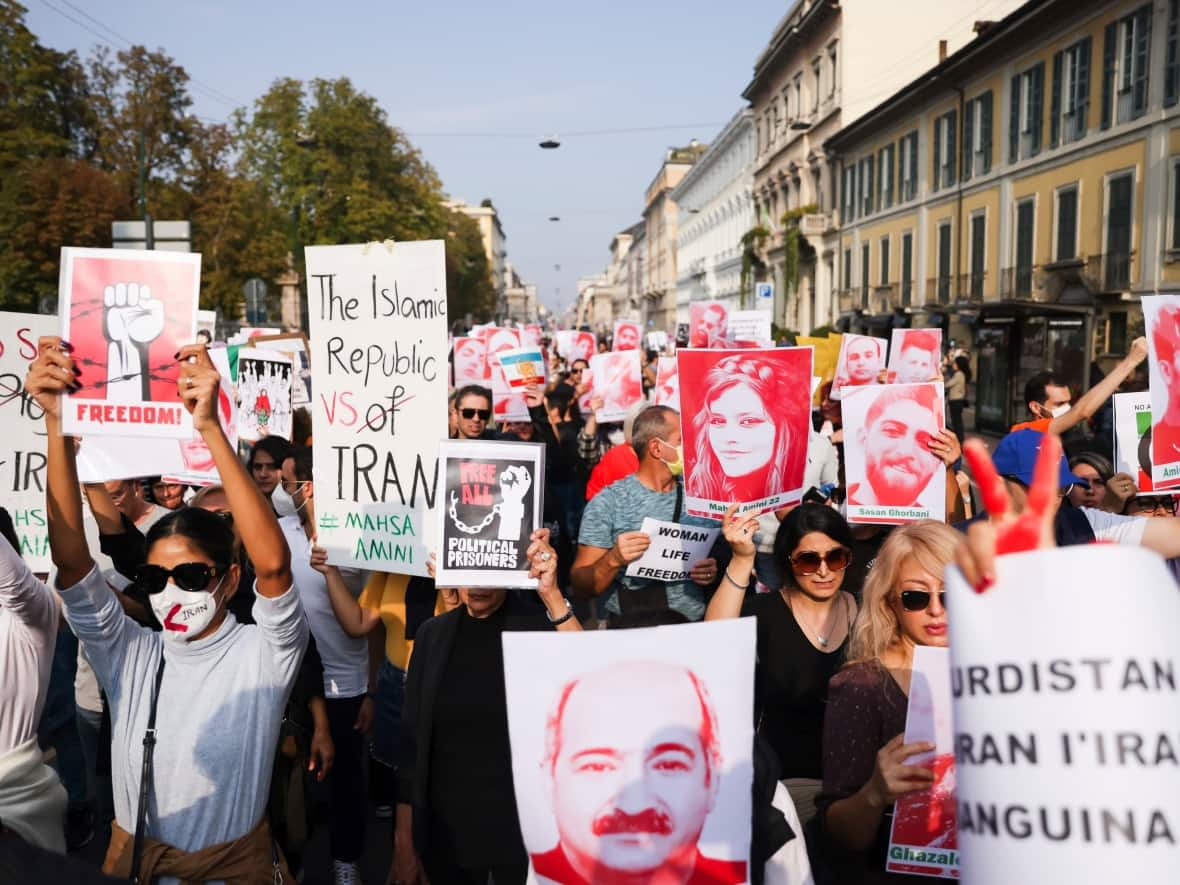
Update: Toomaj Salehi has reportedly been arrested by the Iranian regime. CBC News has not independently verified the reports.
As one of Iran's most popular rappers, Toomaj Salehi has been in hiding since protests against the clerical establishment erupted last month, leveraging a network of supporters and technical tools to circumvent internet censorship and distribute his dissident music.
With hundreds of thousands of followers on Twitter and equally high YouTube views, he has used his lyrics to openly criticize the regime, channeling a collective social anger over the way Iran has been ruled since the 1979 Revolution.
Protests erupted in September, following the death of 22-year-old Mahsa Amini, who was arrested by morality police in Tehran, the capital, for allegedly violating Iran's rules requiring women to wear a headscarf in public.
As young people and oil workers took to the stress by the thousands, the Iranian regime quickly resorted to lethal force to try and silence protesters. Social media was flooded with videos showing security forces and plainclothes agents brutally cracking down on women, men, young students and even the elderly.
But the regime's response is not limited to a physical crackdown. Authorities have swiftly turned to technology to stop information, and those videos, from getting out of the country, according to internet monitoring groups.
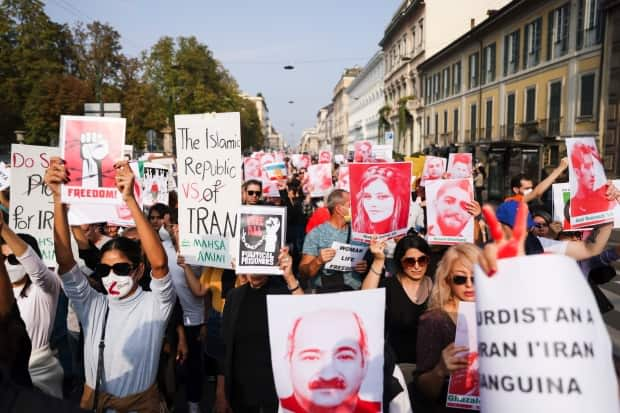
Shutting down the internet and using facial recognition, are just two of the ways the regime is attempting to stifle protests, according to digital rights groups.
"Filming videos is also hard, because you are making yourself a target for the regime forces," said the rapper known by his first name, Toomaj.
He said he was able to connect for an interview because he uses virtual private networks, thanks to the team around him. Commonly known as VPNs, they allow many Iranians to bypass the censorship set up by the regime, to try to get information to the outside world.
WATCH | Iran's protest movement will only grow, says Toomaj:
What began as protests over the death of Amini have snowballed into a grassroots movement calling for outright regime change, with protesters decrying corruption, unemployment and a sclerotic religious establishment who rule the country.
Iranian authorities, including Supreme Leader Ayatollah Ali Khamenei, have blamed the U.S. and Israel for the unrest as a plot to destabilize the country, without providing evidence.
Estimates from the group Human Rights Activists in Iran suggest more than 260 protesters have been killed, including more than 35 children, with some 14,000 arrests. Many assume the numbers to be much higher, given the challenges in getting information out of Iran.
Deadly crackdowns on ethnic minorities
What foreign audiences see trickling out of the country is just a small glimpse of the crimes being committed by the regime, and how widespread the protests really are, Toomaj said.
London-based internet researcher Mahsa Alimardani said the government's internet censorship accompanies "offline brutality."
"Whenever there is brutality, there are shutdowns or severe disruptions," she said.
If you pretended to fall asleep while they were shedding blood ... Just know that we don't have blank votes, there is no neutrality in this war
- Toomaj, lyrics from Soorakh Moosh (Mouse Hole)
According to rights groups, the repression by security forces has been particularly grave in provinces home to ethnic minorities, who have long-standing grievances against the Islamic Republic.
Alimardani, who focuses on freedom of expression and access to information online in Iran, said the country's internet network has been almost completely shut down this month.
"Most mobile carriers have been down during mobile curfews throughout these protests. During these 'curfew' periods, that occurred between 4 p.m. to 1 a.m., home broadband is even sometimes struggling.
"We've also been seeing much more severe regional and prolonged shutdowns and intense disruptions in provinces like Kurdistan and Sistan-Baluchistan. Some of the most horrifying massacres have happened in these provinces."
Confirming the scale of the regime's crackdown is made even more challenging by the lack of foreign journalists based inside Iran. According to Reporters Without Borders, Iran is one of the world's 10 worst countries for press freedom, limiting the free flow of information to the outside world.
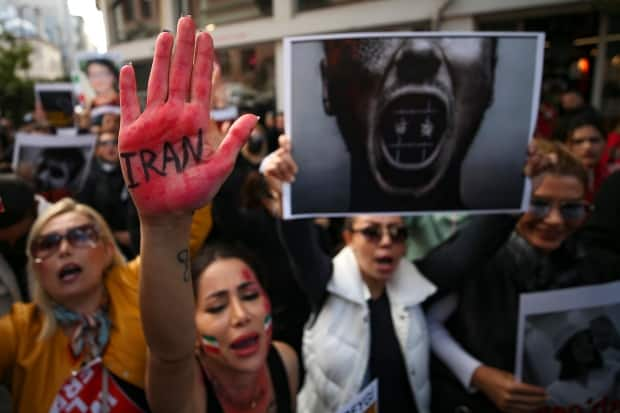
Artists targeted
"We live somewhere horrific. You are dealing with a mafia that is ready to kill the entire nation … in order to keep its power, money and weapons," Toomaj said of the crackdown.
Intimidation by regime forces extends to artists in the country, who try to practice and perform their craft in the face of immense pressures and restrictions imposed by the regime, observers said.
The rapper said he doesn't fear for his own life or safety, but worries that his arrest would dampen the spirit of young protesters.
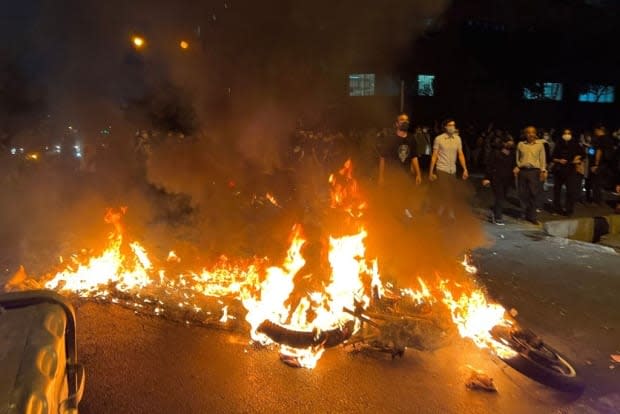
Early in the protests, 25-year-old singer Shervin Hajipour was detained for days after he posted a video of his song Baraye. The video went viral, garnering 40 million views in 48 hours, before being taken down. Baraye translates to "for" or "because of" in Farsi. The lyrics are a collection of tweets Iranians posted on Twitter, with reasons why they are demonstrating.
The song has since turned into the unofficial anthem of the protests, striking a chord with people inside and outside of Iran. It received at least 95,000 of the 115,000 submissions for a new Grammy Award honour for Social Change.
While Hajipour has since been released, he posted a video on his Instagram account distancing himself from the song. Many experts believe it was made under duress and surveillance of the regime.
'Women, life, liberty'
Women have been at the forefront of these protests, observers said. They started protesting by burning their hijabs and cutting their hair. Increasingly, social media videos show women walking the streets, sometimes hand in hand, without wearing the headscarf.
Toomaj said women have always played a central role in protests since the Islamic Revolution in 1979, but the intensity of the violence they face today is different.
"In the past, regime forces would sometimes hesitate a bit or respond later to hit women, but now — we see that they really don't care," Toomaj said.
WATCH | Women often 'first in line' at Iran's protests, says Toomaj:
In unprecedented images, young schoolgirls are joining the mass protests, waving their hijabs in the air and giving middle fingers to photos of the country's supreme leaders. In one viral video, young girls without their hijabs confront a regime official at their school and force him to leave the premises as they shout: "Shame on you!"
The UN human rights office said a number of schools have been raided and children have been arrested by security forces. Iran's minister of education confirmed that an unspecified number of children had been sent to "psychological centers" after they were arrested allegedly for participating in anti-regime protests.
It took several days for media outlets outside of Iran to be able to confirm the killing of 16-year-old Asra Panahi at the hands of regime forces, after they raided her school in Ardabil. She and her classmates had refused to participate in a pro-regime event.
Regime adds hurdles for tech-savvy Gen Z
With a large share of Iran's population under the age of 30, critics say the country's Supreme Leader Ali Khamenei, a geriatric cleric, is facing the biggest challenge to his regime from a generation utilizing technology to have their voices heard.
But the government has its own tools. "There is an extreme advancement in the type of technology also being deployed [by the regime] to disable the technology they [protesters] use," Alimardani said.
Data from the watchdog group NetBlocks shows Iranian authorities have launched the most severe internet restrictions since anti-regime protests in 2019.
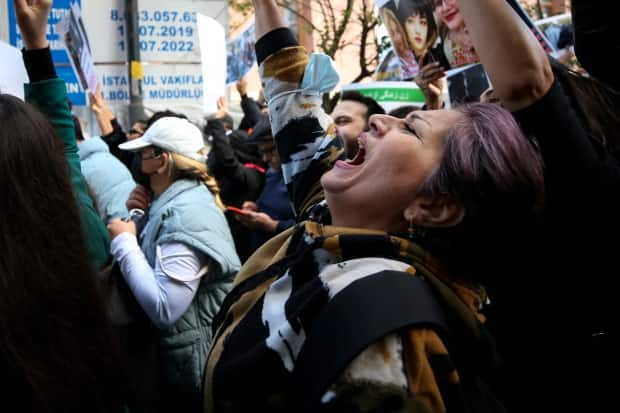
Alimardani said for the first time, the regime has also blocked the Google Play Store — a significant hurdle for a population where many use Android smartphones. WhatsApp and Instagram are also blocked, along with Twitter and Facebook which have long been inaccessible in the country.
Toomaj instead uses his Telegram application to update protesters and Iranians outside of the country. Multiple times a day, he posts messages and voice notes about what is happening in different cities and encourages people not to lose hope.
'No going back, no reform'
Toomaj said part of that endurance is due to the realization by many Iranians that "there is no such thing as reform."
"You can't debate with these people," he said of the regime's clergy, politicians and officials. "This regime is based and built on an ideology — an Islamic governance, so you cannot reform it, or else it won't be an Islamic government. The lashes we receive — is because of that ideology."
While some have opined that the movement's momentum will be hurt because it is leaderless, Toomaj said there is purpose for this.
"There is no one so grand for us all to idolize … Not everyone would unite behind one person right now."
The future of Iran
There are no signs the regime will stop its internet blackout. Iran's Minister of Communication, Issa Zarepour, recently indicated that the internet clampdown will continue as long as protests persist.
"Selling anti-filtering tools is unauthorized, but unfortunately it has not been criminalized. Efforts are being made to criminalize this issue," Zarepour said of VPN's popular with young activists.
This month Canada, the U.S. and EU hit Zarepour with sanctions for overseeing the internet restrictions.
Toomaj predicts a full collapse of the regime in the future; other analysts aren't so sure, noting that large demonstrations have happened before.
"It's not a computer game. It will take time," he said.
"A free Iran is going into the street and seeing police and feeling safe … It's a society where there is no gender apartheid," he said. "A free Iran is something very straightforward and obvious."


